Nigeria. Lagos, the largest complex in the Guinea Gulf faces huge challenges.
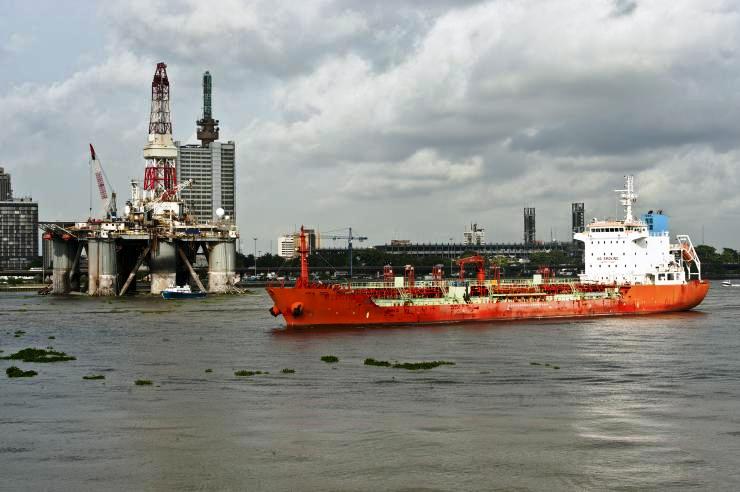
The Lagos complex, with the new Lekki container port and the neighbouring Tin Can Island port, is the largest maritime hub in the Gulf of Guinea. But Nigeria’s ports face many challenges, including congestion, corruption and piracy.
With an annual cargo volume of 27 million tonnes, the Port of Lagos is the second largest seaport in West Africa. The original Apapa Port, opened in 1913 and located on the Bay of Benin, remains the country’s oldest and largest in terms of both land area and cargo handled, with a total area of 80 hectares.
It has five private terminals operated by AP Moller, ENL Consortium Limited, Apapa Bulk Terminal, Greenview Development Nigeria Ltd and Lilypond Inland Terminal. These facilities handle cereals, grains, machinery, construction material, vehicles, food, minerals, fertilisers and industrial raw materials. The port also houses a crude oil and petroleum terminal beside four fishing wharves. In addition, it also boasts from a container capacity of 1,000,000 twenty-foot equivalent units (TEU).
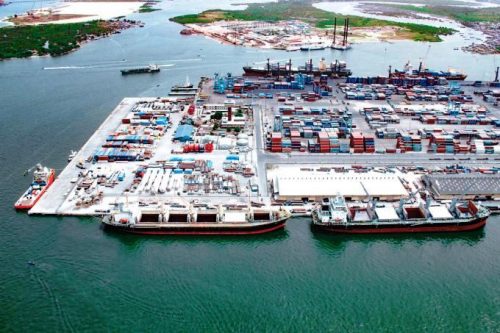
Port of Lagos. It has five private terminals. Photo: Nigeria Ports Authority
In 1975, a second port was established at some 7 km from the centre of Lagos to the West of Apapa to cope with growing congestion problems. The Tin Can Island port handled in 2021 a cargo volume of 1.6 million tons including liquid bulk, dry cargo, roll on roll off and breakbulk on its 12 berths capable of accommodating 260 meters long vessels.
The port is also boasting from a container terminal managed by a consortium made of the China Merchants Holding International, the China Africa Development Fund and the Geneva-based Mediterranean Shipping Company which was designed to handle 650,000 TEU annually.
Nigerian ports handle 2/3 of imports, mainly industrial equipment, refined petroleum, chemicals and food, and 1/3 of exports, mainly crude oil. Over the last five years, Nigerian ports handled an average of 77.6 million tonnes per year. However, data from the Nigerian Ports Authority (NPA) shows that in 2023, traffic volume was below this level at only 70.48 million tonnes, while container traffic was 1.57 million TEUs, down from 1.68 million TEUs in 2022. There is a lot of room for improvement in the profitability of container terminals: on average, about 80% of the total export container traffic is empty. On the other hand, the average turnaround time of vessels will be four days in 2023, compared to 5.2 days in the previous year, due to the positive impact of the new Lekki Deep Seaport, located 65 km south-west of Lagos, which will achieve an average turnaround time of only one day.
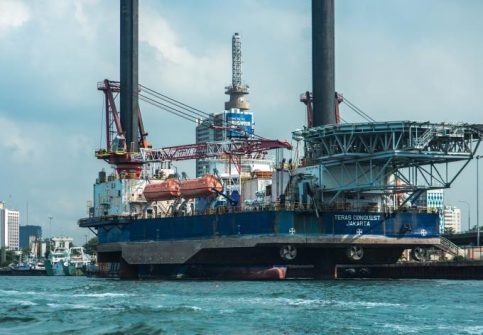
Ships berthed at the Apapa wharf in Lagos. Shutterstock/Alucardion
According to Nicolas Sartini, the executive vice-president of the ports and terminals of the French-based CMA CGM Group which holds the sub-concession of the Lekki container port which was built in the Lagos Free Zone, this new infrastructure can accommodate vessels of a 18,000 TEU capacity and should be a game changer in West Africa. But under one condition: accordingly, it is necessary to improve the access roads to the port and the future industries including a cement factory scheduled to be built around the port. The new port which started its operations in 2023, is a partnership between the China Harbour Engineering Company which obtained the wider port concession for 45 years and has built the port, the Tolaram Group from Singapore, the State of Lagos and the Nigerian Port Authority.
The total investment of $ 1.65 million includes the construction of 50 hectares area with two container berths and a total annual capacity of 1.2 million TEU. Upon completion of the final phase, the port will reach a total capacity of 2.7 million TEU, larger than that of the port of Abidjan, just after the Ghanaian port of Tema which should reach a capacity of 3.5 million TEU by 2025.
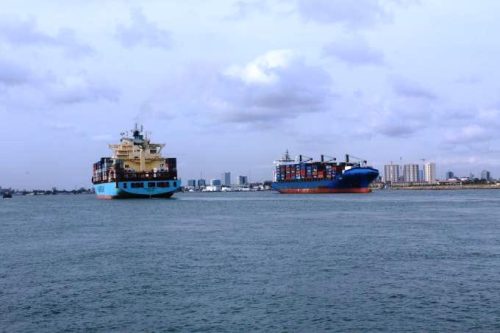
Maersk Line arrives as MV Leto Monrovia leaves the port of Lagos. Shutterstock/ Dumbra
With the construction of the Lekki Deep Seaport, the NPA expects to improve the port efficiency and cost-effective port operations and to reduce the delays in the import of raw materials and equipment. To that effect, the CEO of the NPA, Mohammed Bello-Koko has made plans for advancing automation and digitalization.
The NPA also hopes to capitalize on the African Continental Free Trade Area agreements to develop the port activities.
Yet, a number of challenges must be addressed. One of the most important is the congestion at the Port of Lagos which explains why a significant portion of the cargo destinated to Lagos or originating from there transits through Cotonou (Benin) and Lomé (Togo). Lagos depends also sizeably from the collaboration with the ports of Abidjan, Tanger and Tema. Lomé is a serious competitor with a volume of cargo of 22.6 million tonnes and a container capacity potential of 1.5 m TEU in 2019. It is estimated that inefficient service delivery and gridlock have made Nigeria lose a total of 56 million tons of cargo to Togo, Benin, Cote D’Ivoire and Ghana between 2016 and 2020. The Danish consultant Dynamar estimates that the port of Lagos is losing $ 55 million per day because of the congestion.
According to the European Journal of Maritime Research, in November 2022, the Nigerian ports had the highest cargo dwell time in West Africa, being 475% times higher than the global average of 4 days, 64% higher than that of Cotonou, 53% higher than that of Tema and 156% higher than that of Lome. The average dwell time in Nigeria was 23 days in 2017 against 9 days for Cotonou, 14 days for Lome and 15 days for Tema. Accordingly, the transactional dwell time (spent in formalities with customs authorities) accounted for 73% of the total cargo dwell time. Nigeria ranked 110th on a list of 160 countries established by the World Bank in 2018, in terms of port logistics.
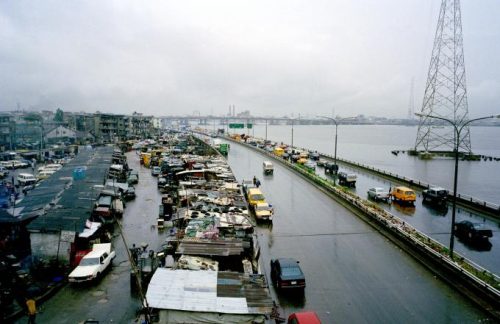
View of Lagos. Due to the large urban population and port traffic volumes, Lagos is classified as a Medium-Port Megacity. File swm
According to the French strategy consultant OKAN Partners, port logistics has improved since the average time spent by a ship at berth is now lower than two days in Nigeria like in Ghana or Togo. But the immobilization of containers in Apapa is still too long (22 days as against 12 days for Douala and Luanda).
According to the Manager of Lagos Port Complex Apapa, Charles Okaga, many challenges still hamper its efficiency, including the manual examination of cargoes by customs due to lack of scanners and the poor access roads. Beside logistical challenges, the efficiency of the port is also negatively affected by fraudulent customs practices.
Piracy in the Gulf of Guinea, which is mainly perpetrated by Nigerian gangs remains challenging. Pirates are often well armed and violent. They attack and hijack ships and kidnap crews along or far from the coast in rivers, anchorages, ports and surrounding waters. Generally, all waters in off Nigeria remain highly risky, reports the International Maritime Bureau of the International Chamber of Commerce. Vessels are advised to be vigilant as many incidents go unreported. Kidnapping for ransom remains the biggest risk for crews. In 2023 alone, 23 incidents were reported in the Gulf including one hijacking, seven kidnappings, one combination of both and firing upon vessels on four occasions. There were also 10 boardings , according to the US Office of Naval Intelligence January 2024 report. Incidents occurred in Angola, Togo and Ivory Coast rather than in Nigeria itself. Clearly, after a significant decline in 2021 and 2022 piracy was on the rise again last year.
The relative progress was owed to Nigeria’s Deep Blue Project, launched by President Muhammadu Buhari in June 2021 with the creation of “The Integrated National Security and Waterways Protection Infrastructure of the Nigerian Maritime Administration and Safety Agency’ (NIMASA) which allowed a combination of Nigeria’s navy, army, air force, and police to cooperate to counter piracy.
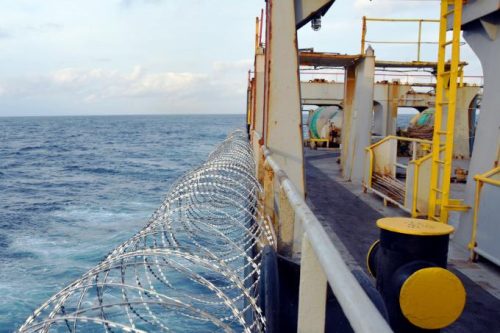
Barbed wire or razor wire attached to the ship hull, superstructure and railings to protect the crew against piracy attack passing Gulf of Guinea. Shutterstock/ Luciavonu
Another reason for the drop in piracy was the decision in 2022 by the Nigerian government to hire one of the most important gang bosses, the former rebel leader turned strong-man, Tompolo believed to be in control of Nigeria’s strongest militia/criminal network responsible for a majority of the pirate activity in the Gulf. Indeed, on that year, following a period of unprecedented pirate activity and industrial scale theft from oil pipelines, the Nigerian authorities awarded a pipeline security contract worth about $ 200 million per year to Tompolo, adapting the proverb that the best rangers are former poachers. The involvement in 2021 and 2022 of several Western navies from United States, Spain, Belgium, Denmark, Italy France and the UK had a deterrent effect: in 2021 and 2022, attack numbers were significantly lower than preceding years. But these foreign navies often lack the legal instruments to arrest pirates. (Ship with oil rig in the background in the Nigerian capitol Lagos. Shutterstock/vanhurck)
F.M.



